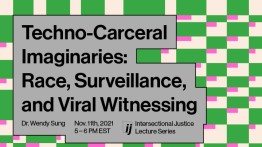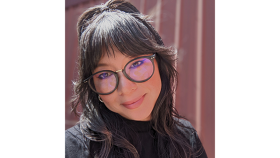Wendy Sung, "Techno-Carceral Imaginaries: Race, Surveillance, and Viral Witnessing"
Thursday, November 11, 2021, 5 - 6pm

In the summer of 2020, the calculus of United States political action reached a new apex: Black Lives Matter protests, galvanized by multiple viral videos demonstrating the mounting disposability of Black life, resulted in the largest mass social movement in US history. George Floyd. Walter Scott. Philando Castile. Eric Garner. Sandra Bland. With the democratization of mobile recording technologies, all of their deaths or arrests were captured by bystander witnesses who recorded and circulated these videos online in the attempt to bring about accountability, safety, and transparency.
The prevalent idea that technological progress and advancement is the solution to many social problems like racism and police brutality simplifies the more complicated relations between racial violence, technology, and surveillance. In this lecture, Dr. Wendy Sung troubles this discourse of techno-utopianism that often equates technology as synonymous with racial progress. Instead, this lecture asks, what can popular culture and social media teach us about these relationships that we might not expect? Examining how the prison is represented in relation to viral witnessing, this talk analyzes how the television show, Black Mirror imagines and critiques the relationships between the carceral, race, entertainment, surveillance, and acts of witnessing. In light of viral video after viral video of state-sanctioned racial violence, what are our responsibilities as to the people we encounter? How might we find ways of doing the critical work of care in a world filled with white supremacist and gender violence? And finally, how might we gaze back at the surveillance technologies that dominate our world?

An interdisciplinary scholar and educator trained in Ethnic Studies, Digital and Media Studies, and American studies, Wendy Sung, Ph.D., is an assistant professor in the Department of World Arts and Cultures/Dance at UCLA. Her work sits at the intersection of comparative histories of racialization in the U.S., media and digital culture, and the dynamics of visuality and cultural memory. Her research and teaching are animated by two questions: how do media and digital technology instantiate new relationships of racialization, visuality, and knowledge? And conversely, how do racialized subjects innovate, concretize, or challenge paradigms of the technological? She asks these questions to not only reconstruct racial histories of digital technologies in the longue durée, but also to critically examine historical claims about the distinctiveness of modern digital practices and epistemologies. Informed by feminist and critical race studies, Sung has examined varied visual media such as street art, reality television, Twitter, and biometrics.
Prior to joining the World Arts and Cultures/Dance faculty, Dr. Sung was an assistant professor of Critical Media Studies at UT Dallas, where she was the co-architect for the Ethnic Studies minor, now the first minor to concentrate on the centrality of race and is the centerpiece for the University’s social justice initiatives. She received her Ph.D. from University of Michigan’s Department of American Culture and her work has been supported by the Institute for Citizens and Scholars and the UC President’s Postdoctoral Fellowship Program.
This series is co-organized by the Office of Student Affairs and Nada Ayad, Associate Dean of HSS, as a continuation of a reading and discussion series for first-year students that was held as part of the Fall 2020 new student orientation. In the spirit of The Cooper Union mission, the Black Student Union and the Cooper Climate Coalition, along with several other Cooper students and faculty, were deeply involved in the articulation of the program as well as in contributing to the reading list and suggesting speakers.




